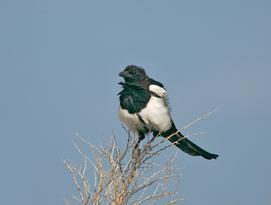BLACK-BILLED MAGPIE OR-227
Hell’s Canyon, Copperfield, Oregon
May 27, 6:12 a.m.
Sunrise at 5:06 a.m.
Picking up where the crows left off (a continuation of OR-226):
The mobbing of the crows attracts the black-capped chickadees (hear their chicka-dee-dee-dee calls) but especially the black-billed magpies. At least a dozen of the magpies gather in the same trees that the crows had just vacated, taking their turn, it seemed, to harass whatever is there that is well hidden from my eyes. An occasional magpie or two drop down to the ground, then fly back up after five to ten seconds.
Gradually, the response of the magpies wanes, too, until all is settled. I had marked the spot, and slowly begin walking toward the large boulder behind which I expect to find, well, I had no idea. A snake? A sleeping coyote?
Minutes later, my approach nearly complete, I peek over the boulder and, to my surprise, there lies a young magpie, dead to the world. All the fuss was about a dead bird!
The who, what, when, where, and why of good reporting comes to mind. I can register the location and time of day accurately, but beyond that I'm left wondering. Do these magpies know the identity of this young bird, or is it just "any magpie"? The crows wouldn't know, to be sure, and it would seem that any explanation for the magpies should also apply to the crows. Perhaps they are just reinforcing in their minds how to separate good from bad in the world, and a dead bird, whether of one's own kind or a close relative (or even a black object of unknown identity lying in the bushes) is a bad thing, and the older birds in the group have the responsibility to point this out to the young, naive birds.
And the chickadees? Perhaps they just got caught up in the excitement?
Background
Black-capped chickadee, Bullock's oriole.

Photo by John Van de Graaff
